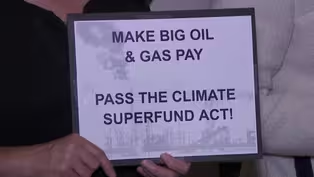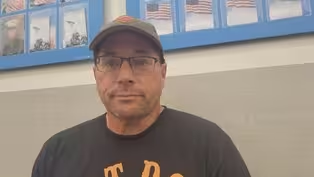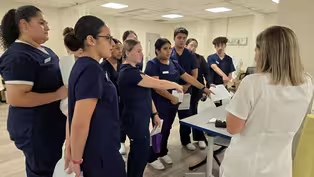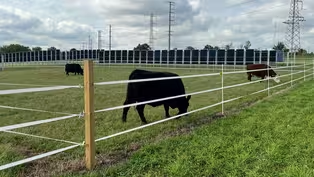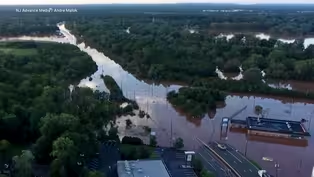NJ Spotlight News
NJ Spotlight News: September 30, 2024
9/30/2024 | 26m 46sVideo has Closed Captions
Watch as the NJ Spotlight News team breaks down today’s top stories.
We bring you what’s relevant and important in New Jersey news and our insight. Watch as the NJ Spotlight News team breaks down today’s top stories.
Problems playing video? | Closed Captioning Feedback
Problems playing video? | Closed Captioning Feedback
NJ Spotlight News is a local public television program presented by THIRTEEN PBS
NJ Spotlight News
NJ Spotlight News: September 30, 2024
9/30/2024 | 26m 46sVideo has Closed Captions
We bring you what’s relevant and important in New Jersey news and our insight. Watch as the NJ Spotlight News team breaks down today’s top stories.
Problems playing video? | Closed Captioning Feedback
How to Watch NJ Spotlight News
NJ Spotlight News is available to stream on pbs.org and the free PBS App, available on iPhone, Apple TV, Android TV, Android smartphones, Amazon Fire TV, Amazon Fire Tablet, Roku, Samsung Smart TV, and Vizio.
Providing Support for PBS.org
Learn Moreabout PBS online sponsorship>> Funding for "NJ Spotlight News" provided by the New Jersey education Association, making public schools great for every child.
RWJBarnabas Health, let's be healthy together.
And, New Jersey realtors, the voice of realtors in New Jersey.
More information online at nj realtor.com.
Briana: Tonight on "NJ Spotlight News," as of midnight tonight the port strike is on.
Many prepare to walk off the job.
>> Mistakes are very high, the potential for disruption is significant.
We have not had an event like this in our ports since 1977.
Briana: Plus, New Jersey's highest court gets the stamp of approval in Trenton.
And, attempting to bring food to those ravaged by hurricane Helene.
>> We have been going three straight days and it is hard, but it is worth it.
We have helped so many people.
This is the most I have helped in one sitting.
Briana: And creating sustainable farming in the state.
A new approach to keep solar panels and cows grazing in the same field.
>> I want people to drive by a farm and see the solar field and see that I get my food there and power.
Briana: "NJ Spotlight News" begins right now.
♪ >> from NJPBS Studios, this is "NJ Spotlight News" with Briana Vannozzi.
Briana: Good evening and thank you for joining us this Monday night.
I'm Briana Vannozzi.
A few key stories we are following.
First, just hours away from a massive port strike that will hit Maine all the way to Texas.
The international longshoremen Association says dockworkers will hit the picket lines at 12:01 a.m. Tuesday morning and a work stoppage that will affect sports along the East and Gulf ports including here in Newark.
It is the first coast wide strike since 1977 and it is expected to triple -- cripple supply chains and cause economic chaos.
This is the union and maritime alliance remain at odds with contract negotiations over wages and union concerns of automation replacing workers.
According to reports the two sides have not met in recent weeks and there are no negotiations planned before tonight's midnight deadline.
Meanwhile, a mad dash to get cargo out before at 2:00 p.m. deadline.
Authority leaders provided updates today.
A spokesperson for Governor Murphy said he is in close contact with the White House and ILA.
>> The Port Authority has been working around-the-clock to get critical cargo out of our facilities, food products, medical supplies, other essential goods.
We are also working closely with the commercial trucking industry to ensure these items reach their destination.
It will be a major disruption for thousands of independent truckers as well.
We are focused on medical supplies and making sure all facilities have what they need to continue caring for their patients.
Number one, when it comes to pharmaceuticals, pleased to report the number -- majority of pharmaceuticals arrived at their destination by air travel.
Pharmaceuticals are not expected to be in a problematic situation.
Briana: Also tonight, former Attorney General Hoffman will be the newest associate justice on the state Supreme Court.
Hoffman sailed through a full Senate confirmation this afternoon after his nomination was unanimously approved by the judiciary committee last week.
The 59-year-old Republican was recently Rutgers chief counsel and will replace Lee Solomon who retired when he reached the mandatory retirement age for judges in New Jersey.
Hoffman served as acting Attorney General three years under the Christie administration.
He faced criticism for his handling of the Bridgegate scandal before handing the investigation to federal authorities.
Senators on both sides of the aisle called him a class act and praised his record.
Hoffman is expected to be sworn in before the court reconvenes this fall.
The nation beginning to see the full scope of destruction caused by hurricane Helene across much of the South.
The storm made landfall as a category 4 in Florida's Big Bend region Thursday evening and blasted across Georgia and North Carolina, South Carolina, Tennessee and Virginia.
The storm dropped historic amounts of rain in those areas with record-setting floods, triggering landslides in mountain communities.
More than 100 people are confirmed dead.
Millions more remain without power and others are unaccounted for because cell service is down through most of the region.
The Epicenter of destruction is in Asheville, North Carolina, where 14 members of New Jersey's task force one deployed to help with search and rescue operations alongside federal and state authorities.
But private citizens are also trying to lend a hand, including market, a high school teacher from Ocean Gate who lost his home during Sandy and is committed to helping survivors of other storms with his charity, "hold on, I'm coming," providing hot meals and supplies as quickly as possible.
He joins me from Vidalia, Georgia.
You pick up and leave on a dime to go to natural disasters.
Where are you at right now and what destruction do you see?
Mark: I am in Vidalia, Georgia, home of the Vidalia onion.
Just found that out yesterday.
We did not get to see much of the damage because we came in around 3:00 in the morning so it was really dark, but we had a lot of trees to navigate around, roads damaged, but what people coming to us are talking about is the infrastructure.
Power lines are down everywhere, trees, a lot of trees are down.
They were ill prepared for this, not ready for a hurricane of this magnitude.
That is what the big problem is.
There is no electricity, not a lot of water.
They are running low on water.
Food is running out because there is no refrigeration.
They are in a bad state right now.
Briana: What type of supplies did you pack in your trailer and do you feel you have enough given what you have been confronted with so far?
Mark: I'm a one-man operation.
I'm lucky enough to have my friend Brian with me today.
I tried to keep it simple.
I just do hotdogs.
They are simple, I can keep them cooking while doing other things.
We brought 700 hotdogs down-and-in four hours, we were out.
Through donations we were able to get 2000 more while we were down here.
We gave out 1300 of them yesterday.
We procured another probably 600 or 800 today.
Looking at another thousand today and then we give away potato chips and things like that.
Snacks, granola bars, water.
We had iced tea and Gatorade, I had 60 gallons of Gatorade, that is gone.
I had probably 80 gallons of iced tea, that is gone.
Now we are just, bottled water.
We are giving that away.
We still have gallons of water.
A couple of locals that have water were able to fill up drugs for us and bring them back so we have freshwater to hand out.
Briana: You say you keep it simple with hotdogs but you know firsthand how something simple like a quick meal or drink, clean water, can make a difference when you're faced with your own mortality and loss of everything you and your family have had.
Mark: yeah.
I went through it.
I went through it -- shoot.
I get tired and I get emotional.
We went through it and I had a lot of people help me.
That is why I started this organization, because I know those first few days are really hard.
The big organizations are not here yet.
I know the Salvation Army got to one church yesterday, but the Red Cross is not here yet, FEMA is not here yet.
They have little things, but are not able to do things because they are so big it takes a while to get rolling.
This storm was so huge I would not want to be involved in the logistics of helping six or seven states right now.
I try to find the little town that is forgotten.
Not that we were.
We had a lot of people come help us right away, but these towns need help.
They are poor people and need a lot of help.
Briana: You feel it so deeply for them because you have walked in their shoes.
Mark: Exactly.
So many people came to help me and this is my way of putting it together and giving back.
This is why I did it.
Sorry, I am really tired, too.
We have been going for three straight days and it is hard.
But it is worth it.
We have helped so many people.
This is the most I have ever helped in one sitting.
Briana: You have had to mobilize to places that have seen dire destruction.
How long do you plan on staying?
Both given the supplies and also emotionally, because it is exhausting work, as rewarding as it is.
Mark: It is.
My plan is, I will probably leave tomorrow night.
We got down here 3:00 a.m. Saturday morning and worked all day Saturday, all day Sunday, we will work all day today.
We will probably head home Tuesday evening as soon as we can get packed up and everything is ready to go home.
Briana: Stay safe.
Thank you for the work you are doing.
We know you are a one-man operation, donations based.
One person can make a difference.
Please stay safe for us.
Mark: Thank you.
Briana: In New Jersey survivors of another destructive storm are hoping relief is finally on the way more than three years later.
For a second time lawmakers are introducing a bill to provide mortgage relief for families affected by hurricane Ida.
We reported on the original bill's passage only to be met with Governor McMurphy's veto pen, requesting tweaks to the legislation.
Brenda Flanagan her testimony from Ida survivors who are running out of time and money and explains the one item lawmakers did not change in the bill.
>> My heart breaks again and again.
Brenda: Survivors of Ida from three years ago arrived in Trenton again to ask lawmakers for help after Governor Murphy vetoed their relief bill, say they have relived of their own trauma this weekend watching folks in North Carolina flee hurricane Helene's catastrophic floods.
They know their grueling recovery that lies ahead financial and emotional.
>> Because you have lived it and feel you living it again with people you don't even know.
>> They don't know what is coming and I hope there is more support there than we have seen as hurricane Ida survivors in New Jersey.
>> We are stranded, struggling.
It is not something most people budget for inner life.
Brenda: Towns devastated by Ida spoke before the committee, backing a newly revised bill to put their mortgage payments on hold for a year.
>> I have dental bills, medical bills, all kinds of other bills on top of learning how to budget for covering -- for recovering from a flood.
>> My kids are still worried about whether we are going to die, if our home will be ruined again every time it rains.
I urge you to pass this bill to ease our financial burdens we can focus on our emotional recovery.
Brenda: Lawmakers in June passed a bill that would have provided Ida survivors a one year break from mortgage payments and protection from foreclosure, but Governor Murphy vetoed it, fearing fraud, he wrote.
He wanted applicants to reach stricter rules.
Requirements so stringent, few if any homeowners would even qualify.
Particularly those living in the Lost Valley who have no viable options besides a blue acres bio.
>> I still get water in my property when it rains.
I still struggle with, what am I going to pay this month?
The mortgage, or pay it -- clean the basement?
>> We have been here before and done legislation like this with Sandy where they did not have all these bureaucratic steps, and people could get the resources they needed.
>> It is like Groundhog Day here, that I keep having to do this bill.
Brenda: Senator Singleton revised his bill to address the governor's concerns so the Department of community affairs would vet all applications through a new online portal as Murphy proposed.
However, Singleton stopped short of restricting claims only to folks who participated in just two specific aid programs.
Instead he opened eligibility to homeowners who received federal disaster assistance for needs related to Ida damage in their primary residence.
He is working with the governor's office.
>> Surprise is not a thing I am a fan of.
We are hopeful because of these conversations there is sufficient light at the end of the tunnel to move forward.
Brenda: Democrats and Republicans unanimously supported the bill.
>> As a mayor who went through Superstorm standing, it is very important to support our homeowners.
I vote yes.
>> I too have been a victim of major floods, lost everything.
You can't plan for this.
I am glad it came up today so we can make sure it is passed.
>> I too don't know why we are here redoing this bill but I say yes just like last time.
>> I look forward to us concluding this journey.
My vote is yes, the bill is passed.
Brenda: Singleton said there would be changes to the bill, but nothing material to its integrity or intent, which is to make sure all people get the relief they need.
At the Statehouse in Trenton, Brenda Flanagan, "NJ Spotlight News."
Briana: Climate change is intensifying and increasing the number of storms that hit our country every year, and the cost of recovering from natural disasters is getting more expensive.
It is why environmental advocates, elected officials and grassroots groups teamed up today for a rally outside the Statehouse urging lawmakers to pass the climate Superfund act, a bill to make polluters including the largest fossil fuel companies, pay for damages caused by climate change, and give the state treasurer the power to tally up the destruction caused over the last three decades.
Then, task the state Department of Environmental Protection with collecting the damages.
That money would fund a new recovery program to help with everything from infrastructure repairs to upgrades to the electrical grid.
Doug O'Malley from the power NJ coalition is supporting the bill.
>> We need real clean energy solutions and to ensure we are not investing in false clean energy solutions.
Specifically we need a climate Superfund bill to hold oil and gas polluters responsible for the damage they have inflicted, as well as having a 100% squeaky clean legislation.
We need to invest in real solutions.
Briana: What do cows and solar farms have in common?
It turns out quite a bit.
They are part of a renewable energy project, the first of its kind in New Jersey, using land for both agriculture and solar production.
Rutgers University showed off their first attempt at it expected to produce clean energy while making farms more accessible.
>> I want people to drive by a farm, see the solar field and say, I get my food and energy there.
Reporter: Thousands across Route one will see cows grazing alongside solar panels, part of a more than $7.4 million state-of-the-art Agrovoltaic program that combines agriculture and solar power generation simultaneously on the same land.
Today Rutgers researchers, state officials and members of the solar industry held a ribbon-cutting to show off the new project at Rutgers campus farm.
David is part of the team that spearheaded the Agrovoltaics program and says it allows farmers to maximize what they can do on their land.
>> What is unique, typically when solar is built on a farm, it limits what can be done.
Often times the only thing is that the grass is being mowed under the panels.
These have been redesigned to make it former first.
They are spaced out so farming equipment can get through.
They are at a height that allows equipment to pass underneath.
The farmer can continue to farm the same ground while making clean energy with solar panels.
Reporter: With cattle being the number one source of greenhouse gases, Project shows off the benefits of renewable energy for farms.
>> This is a system that provides a good opportunity for farm viability, because the developer of the solar project will pay a lease to the farmer.
They will have a secondary income for that ground.
The lease for the property for solar, plus income from crops.
>> We still need a lot more information about, what are the costs of Agrovoltaics, what are the benefits, best practices and where can you get information?
That is where this project comes in.
Reporter: The more than 300 solar panels behind me will enable researchers to test whether farmers can generate sustainable and profitable production without substantially reducing space for growing crops.
>> The vertical panels, when we were deciding which ones to use, I like these ones here because you can operate equipment around them easy.
There is not a large footprint to hinder what is going on.
Another aspect is the shadow they create moves faster than the traditional ones you see that are tilted.
Reporter: He is the research farm manager for the farm animal program.
He says they also put trackers on the cows to see if they are favoring or avoiding panels.
>> We thought we could do cows.
One aspect is, from the farm standpoint, I have lots of sheep pasture but not a lot of cowpasture.
You need more pastor for cows because they are larger.
We can put cows here and have them graze around the solar panels so we are contributing to sustainability and having the cattle increases that.
Reporter: He says they are monitoring the project to incorporate different livestock and expand to other agricultural landscapes.
Briana: Continuing our reporting on the urgent need for skilled nurses in New Jersey.
According to federal data we are expected to have the fourth largest shortage of nurses in the country over the next decade.
In Ocean County high schoolers are getting a chance to experience the profession firsthand through a pre-nursing program.
It gives juniors and seniors early practical training toward a career in an industry that could really use their help.
Ted Goldberg visited the school to see whether it is piquing students interest.
Reporter: The next generation of nurses love to learn about the human body.
>> Physiology is the coolest thing ever.
>> Learning about the human body is amazing.
>> What happens when we eat, breathe, how do we get oxygen in our blood?
Simple stuff like that.
Reporter: These students are mostly seniors, who have an instructor that is as enthusiastic.
>> My father was an EMT soy started on an ambulance at 14 years old and love everything about this.
What teenager doesn't want to leave the house with a blue light on the dashboard?
Reporter: She is also a nurse at a retirement community where some of her students to clinical rotations.
She is teaching a two-year course that can be demanding for an in demand career.
>> The workload is a lot.
It is a lot of information at once, but if you're interested in the subject, it is second nature.
Reporter: Ocean County College invested in this program, moving into a bigger building to accommodate more students and providing state-of-the-art equipment this summer, like these eerily realistic manikins.
>> A much bigger lab.
We have brand-new manikins and a lot more manikins.
Probably half the size of this was our lab.
Reporter: After the program students can learn -- earn college credit or work as a nursing assistant, careers facing shortages statewide.
>> When my students graduate in two years they are already certified nursing assistants.
Many of them have job offers lined up before they graduate high school.
They will also be CPR certified.
>> Nursing assistants are a vital part of the health care team.
No one does it alone.
When you're in a hospital and health care setting, it takes all parties working together to make for the patients have the best care possible.
Our nursing assistants are critical part of the team.
Reporter: She runs human resources at a rehabilitation hospital.
>> They do clinical rotations with us and students enjoy that thoroughly.
Our staff enjoy having them, they love to teach and show them what rehab is about.
Reporter: Her hospital hired one student as a nursing assistant this past summer.
>> We would love to build more partnerships like we have and develop a pipeline of students to fill those positions.
Reporter: She says her students can make upwards of $24 an hour as a nursing assistant without a single dollar of college debt.
Or, they can get a head start on becoming a licensed practical nurse or registered nurse.
>> I have facilities knocking on my door to talk to my kids.
They are in superhigh demand.
Some of my kids will go work right after high school or before they graduate, and some will take their knowledge, their certification, and go, LPN school or for their RNs.
Reporter: If nursing is something you would like to try, it would not hurt to apply soon.
Briana: That does it for us tonight.
Before you go, a reminder to download the "NJ Spotlight News" podcast to listen to us anytime.
I'm Briana Vannozzi.
Thanks for being with us.
We will see you tomorrow.
>> NJM insurance group, serving the insurance needs of residents and businesses for more than 100 years.
Horizon Blue Cross Blue Shield of New Jersey, an independent licensee of the Blue Cross Blue Shield Association.
And by the PSEG foundation.
>> NJM insurance group has been serving New Jersey businesses for over a century as part of the garden state, we help companies keep their vehicles on the road, employees on the job, and projects on track.
Working to protect employees from illness and injury, to keep goods and services moving across the state.
We are proud to be part of New Jersey.
NJM, we have New Jersey covered.
♪
NJ lawmakers, activists rally behind 'Climate Superfund Act'
Video has Closed Captions
Clip: 9/30/2024 | 1m 25s | Legislation would seek reparations from large fossil fuel corporations (1m 25s)
NJ teacher hits the road to help Georgia victims
Video has Closed Captions
Clip: 9/30/2024 | 6m 56s | Interview: Mark Haug, a high school teacher who lost his home during Sandy (6m 56s)
Ocean County vo-tech tackles nurse shortage
Video has Closed Captions
Clip: 9/30/2024 | 4m 1s | Students can kick-start their career as a licensed practical nurse or registered nurse (4m 1s)
Rutgers: Cows and a new innovation in solar energy
Video has Closed Captions
Clip: 9/30/2024 | 4m 17s | Cows graze beneath solar panels that rotate and maximize sun exposure (4m 17s)
Still 'stranded and struggling,' Ida survivors plead for aid
Video has Closed Captions
Clip: 9/30/2024 | 4m 35s | Sen. Troy Singleton working to expand eligibility to more homeowners (4m 35s)
Providing Support for PBS.org
Learn Moreabout PBS online sponsorshipSupport for PBS provided by:
NJ Spotlight News is a local public television program presented by THIRTEEN PBS
